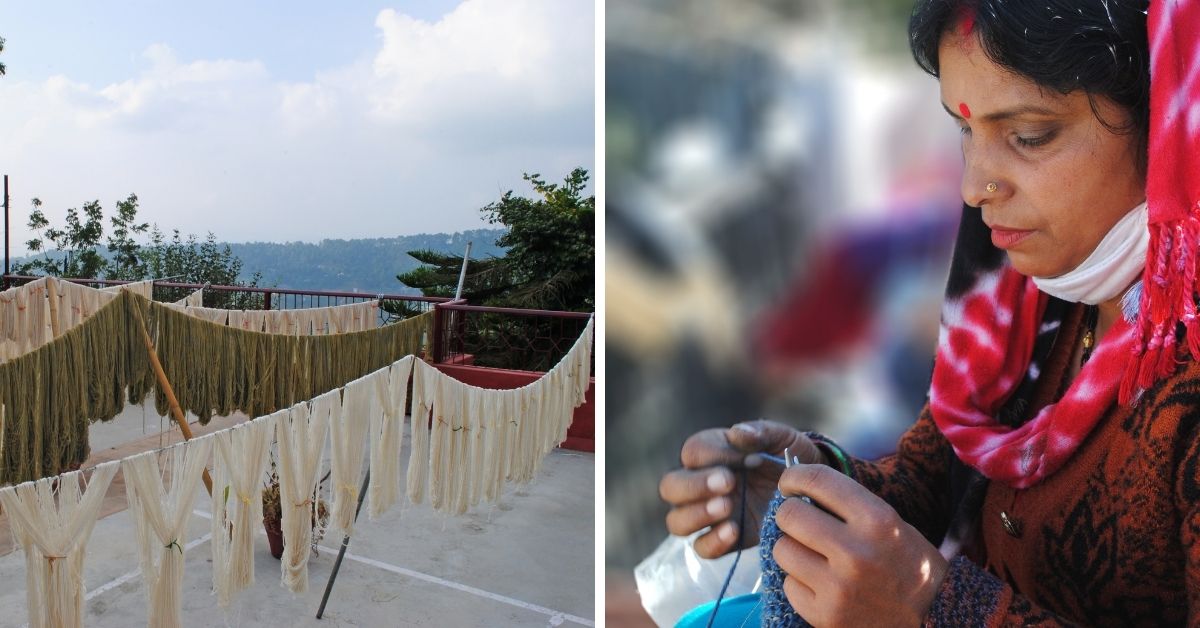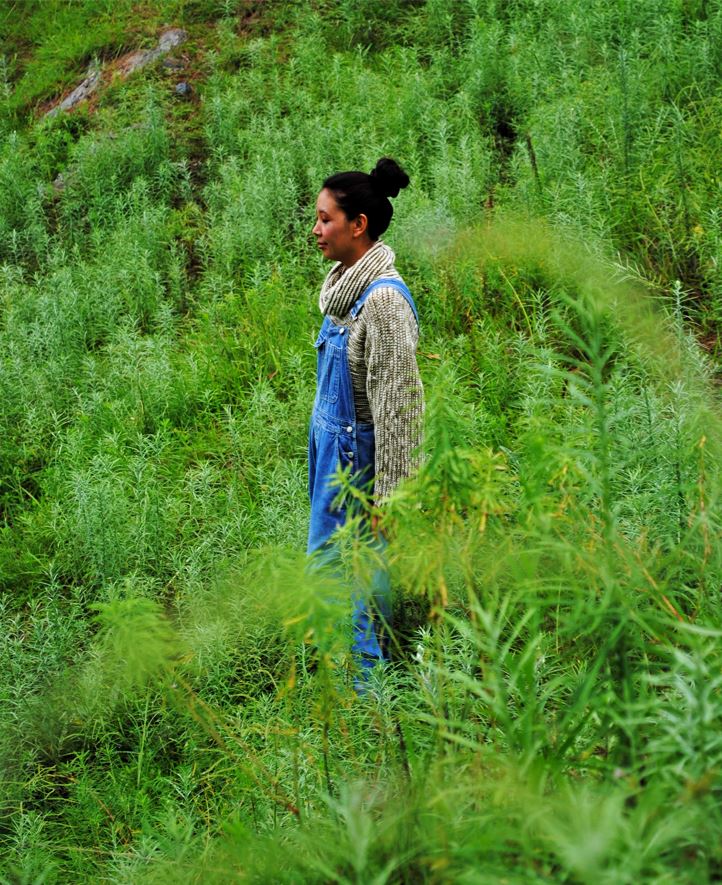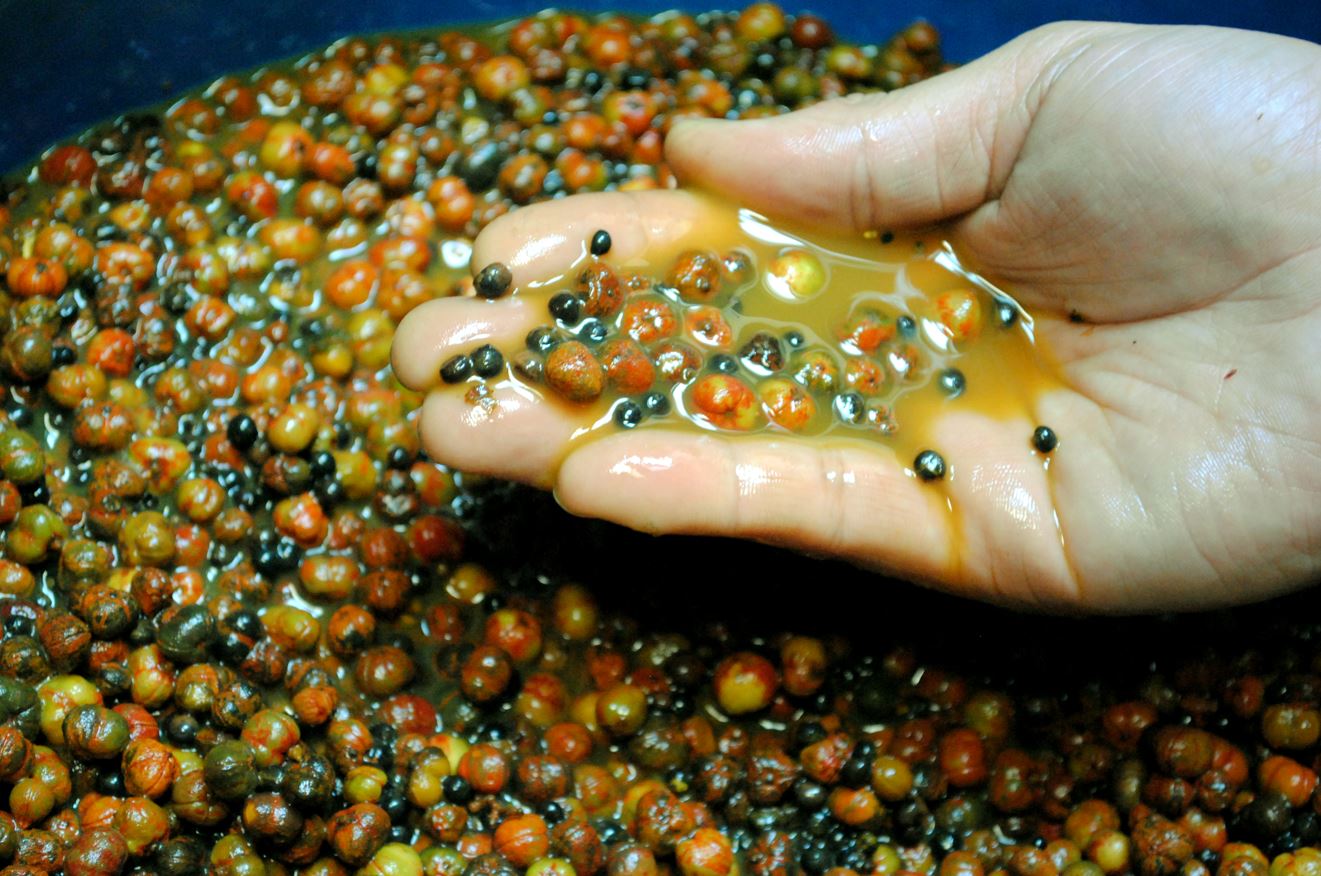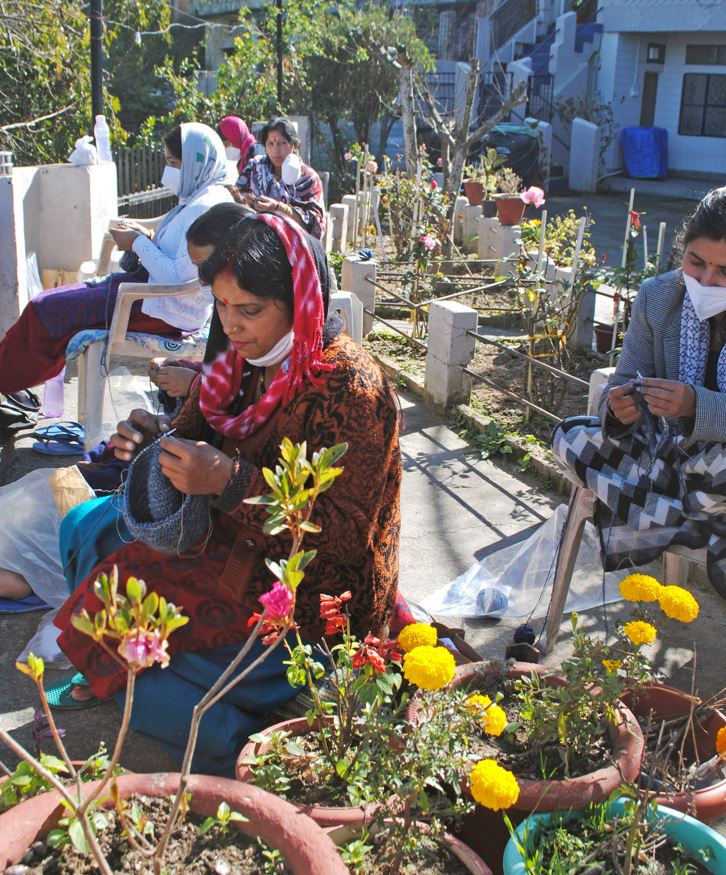NID Alumni Make Clothes Using 100% Rainwater & Solar Energy, Brand Reaches US & UK
National Institute of Design, Ahmedabad, alumni – Abhinav Dhoundiyal and Vasanthi Veluri started Peoli to promote slow fashion, women empowerment and the use of natural dyes and fibres.

Tucked away in scenic Almora in the Kumaon region of Uttarakhand, is a bustling textile design studio – Peoli. Founded in 2015, by two alumni (and batchmates) of the National Institute of Design, Ahmedabad – Abhinav Dhoundiyal and Vasanthi Veluri, Peoli is named after the yellow wildflower native to this region. The Peoli blooms through spring and the duo believes it brings warmth and hope after the long, harsh winter. Just like what they hope their venture is doing for the local populace.
Peoli is a remarkable venture for several reasons. It uses only natural fibres and dyes and is reviving traditional skills. Also, it follows several eco-friendly practices and empowers the local women it employs by giving them a comfortable livelihood.
On offer under the Peoli brand are overcoats, pullovers, cardigans, shawls, scarves and accessories like socks, caps, gloves, and bags. While Abhinav, who belongs to Almora, leads the design and production, Vasanthi focuses on marketing and sales.
Slow Fashion

“We believe in slow fashion. How much is produced and how often a consumer buys something new are factors that have environmental implications in terms of using natural resources and waste generation. That’s why we ensure the durability of the product as well as keep our designs classic so that they endure in terms of fashion trends. We do not come out with a new line of products every few months. We take a long time to develop our products. We dye and make products in small batches which helps us align our processes with the often uncertain weather conditions,” explains Vasanthi.
Peoli won two awards recently – one for design and the other for being an eco-friendly enterprise. “AIACA (All India Artisans and Craftworkers Welfare Association) honoured us with the first Shilp Udyam Samman for Best Green Enterprise in 2021. The prize amount will enable us to minimise our carbon footprint further. It has helped us increase the capacity of rainwater harvesting and natural dyeing efforts and to expand and reach out to newer international markets,” says Abhinav with a smile.
Green Practices

Natural and indigenous fibres are used to make their apparel and accessories. Cotton from Kutch (grown with less water and no synthetic fertiliser), Harsil wool from Uttarakhand, Tibetan wool, Himalayan nettle and hemp, Ahimsa silk from Assam (obtained without harming the silkworms) and Merino wool (imported from New Zealand) are the main raw materials.
Additionally, only natural dyes and colourants are utilised. Locally available dyestuffs like walnut, kamala, rhododendron (locally known as the burhansh) flowers and pomegranate rinds, are used to derive hundreds of shades.
All processes are hand-controlled. The knitting, weaving, embroidery, beadwork and Shibori (a Japanese tie-dyeing technique) are all done by hand. The fibre is spun into soft, supple yarn using a hand-held spindle or a ‘Bageshwari Charkha’, a foot-operated spinning wheel of indigenous make. Further, the yarn is woven, knitted and stitched by hand.
“At each stage we substitute the usage of machines with human energy, reducing our dependence on non-renewable sources of energy. Both the materials and processes make the product unique and significantly differentiate it from the competition. Skilling and sustenance are top priorities for us. On multiple occasions we have chosen hand-based production over a mechanized one even if it meant an increase in costs,” emphasises Abhinav.
“Since the past two years, we have ensured that all the water we use for our dyeing and other processing is 100 per cent rainwater. We consider this a significant achievement because the mountains are always short of water. Peoli’s average consumption of harvested rainwater has increased from 30,000 litres/month in 2016 to 90,000 litres/month now,” claims Abhinav.
The water source being rainwater, there is no mechanised energy used to procure it. The energy source used during dyeing is renewable, as solar power is used for heating water. Using earth-friendly chemicals to process the textile materials is another significant eco-friendly practice adopted.
During dyeing, continuous dye baths are used to reduce wastage. Also, the dyes are reused multiple times. This ensures that a smaller quantity of effluents is released into the environment. Since the dyes are not chemicals, the effluents are also less harmful.
Further, an attempt is made to preserve, sort and upcycle each bit of yarn and fabric into accessories like bags or scarves. Peoli products are packaged in bags using waste yarn. The raw material is seldom rejected due to defects. In these ways, the mantra of reduce-reuse-recycle is practised at Peoli.
The use of natural textile materials and natural substances for dyeing are soothing for the wearer’s skin as well as for the artisans handling the textiles. Many natural dyes like indigo, madder and harda, which are plant-based, have anti-microbial properties.
Making Choices

Meera Goradia, former director of Khamir, is the founder of craft community Creative Dignity that provides relief to artisans affected by the pandemic. She has visited Peoli and closely observed the design and production processes. Her take on Peoli: “The special characteristic of Peoli is that Abhinav and Vasanthi have succeeded in bringing together the skill sets of the women of Almora with their design expertise and creating a contemporary language together. It’s a partnership between designers, artisans and, of course, the materials!”
“This duo truly walks the talk,” says Meera. “They have made some significant choices. They have not allowed the market to determine their choices. They have decided to scale up intelligently, patiently and gradually. And, they have let the material determine form and design.”
Social empowerment
Swasti Singh Ghai, senior faculty in the textile design department at NID, Ahmedabad, has taught the duo. According to her, “Through their venture Peoli, Abhinav and Vasanthi have demonstrated how design can become a tool for social empowerment while adhering to the four pillars of sustainability – people, planet, profit and culture. At Peoli, there is a celebration of the rustic.”
“The founders have tenaciously held on to their core values making no compromises. Peoli is proof of how appropriate design can aid decentralized, local, culture-rooted livelihoods and yet fetch returns in pounds and dollars,” says Swasti.
Peoli has 11 regular employees (all women) who come to the design studio and work. In addition, there are 40-50 women who work from home and visit the studio when required.
It takes Himani Bisht 15 minutes to walk to the studio from home every day. She lives with her husband, son and mother-in-law. Her husband manages a shop. The cheerful craftswoman says, “I have been working for Peoli for five years. I enjoy working here as I keep learning something new. I knew how to knit, but learnt spinning after joining Peoli.”
Vasanthi says, “Many of the women employed at Peoli are the sole breadwinners of their families. As per their skill level and abilities, they earn Rs 5,000-12,000 per month, which is 50-100 per cent greater than what they could earn elsewhere. When an artisan says with pride that she is now the one who calls the shots at home and not her husband – because she brings money to the table – it gives me such a high!”
“The retail price range of our woollen knitted products for sweaters is Rs 8,000-20,000, overcoats are priced between Rs 20,000-30,000, scarves and shawls are for Rs 4,000-Rs 7,000 and socks, gloves and caps go for Rs 2,000-4,000. Bags are priced at Rs 4,000-5,000,” says Vasanthi.
“We have an exclusive and limited range of designs we release every year. We sell to around 50 premium customers during our selling season each year – November to February. Over the past six years, we have built a small but loyal customer base who spend more than Rs. 1 lakh on each purchase. Currently, we have around five to six Indian as well as international brands we work with at a wholesale level in the US, Australia and China which give us the bulk of our revenue and help us ensure a continuous stream of work for the artisans,” she explains.
The market presence of Peoli has grown to buyers in the UK, Europe, the USA, Australia, China and South Korea. Peoli now has seven stores in India and five stores overseas.
The roadmap ahead? “Going forward, we want to shift our focus to accessing overseas markets (through agents and boutique stores) and increasing our B2B business with larger brands and through wholesale platforms. This has helped us have a steady business during the pandemic. Also, over the next three years, we aim to ensure jobs for 250 women in our region,” says Abhinav.
“Our Peoli is a flower, which has emerged from a strong philosophy rooted in mindful design practices, and we hope to continue nurturing it with our efforts,” says a determined Vasanthi.
(Edited by Yoshita Rao)
If you found our stories insightful, informative, or even just enjoyable, we invite you to consider making a voluntary payment to support the work we do at The Better India. Your contribution helps us continue producing quality content that educates, inspires, and drives positive change.
Choose one of the payment options below for your contribution-
By paying for the stories you value, you directly contribute to sustaining our efforts focused on making a difference in the world. Together, let’s ensure that impactful stories continue to be told and shared, enriching lives and communities alike.
Thank you for your support. Here are some frequently asked questions you might find helpful to know why you are contributing?


This story made me
-
97
-
121
-
89
-
167











